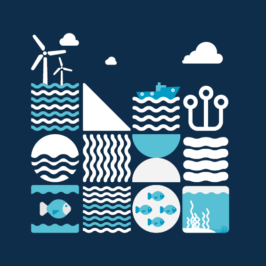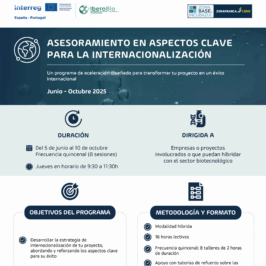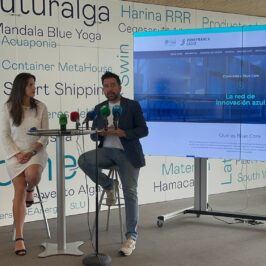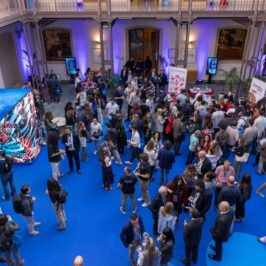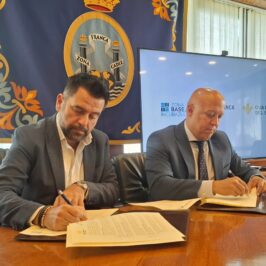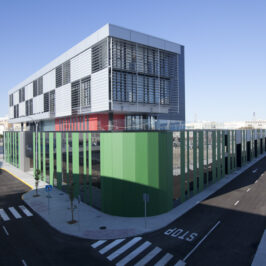
Maria Yamkovaya has been working as a researcher in national and international projects with topics related to the blue economy, development of sustainable tourism and environmental protection. Her university studies were directed towards two joint international degrees: Erasmus Mundus, a Master of Marine and Coastal Management (WACOMA); and a Doctorate in Marine and Coastal Management (MACOMA) awarded by the Universities of Cádiz (Spain), Bologna (Italy) and Aveiro (Portugal). In addition, his research experience includes teaching classes to students, writing proposals and requesting new projects, organizing and conducting research, writing and publishing articles in international journals, disseminating results at conferences, partner meetings and digital extensions. .
We talked to her about complete training program in entrepreneurship and blue economy and the opportunities it offers to entrepreneurs. Their knowledge and experience will be available to everyone who joins the training itineraries #BlueWay of Incubazul.
From a researcher's point of view, to what extent are actions related to the sustainability of seas and oceans advanced?
Thank you for the question. First of all I would like to mention that the ocean plays a very important role on our planet since it covers 71% of the earth's surface; shapes the global climate; absorbs about 70% of CO emissions2 produced by humans; it is a source of biological and mineral resources; it is also a very important form of connection between continents and countries. However, the importance of the oceans is associated with many ecological problems such as pollution with plastic and liquid waste, overfishing, acidification of waters, extinctions of mammals, fish and underwater fauna, among others. That's why, Blue economy measures are necessary and essential to maintain balance both in nature and in the world economy.
But making evaluations related to the level of sustainable development is quite difficult, because the adoption of innovative measures both in coastal areas and in the sea are very expensive and depend on the level of wealth of each country and its capacity to adopt these measures. . Therefore, we can make some conclusions about the European Union (EU), where all actions related to the blue economy are controlled by the European Commission. In 2012, the European Commission established the “blue growth plan” as the current long-term political framework to promote economic activity related to the oceans and seas. In this plan, special attention is paid to five sectors of the blue economy, these are: coastal tourism, aquaculture, blue energy, blue biotechnology and seabed mining, which have significant potential for job creation and innovation. The coastal tourism it is the largest sector of the blue economy in terms of employment and added value, but it also presents problems for the environment and the local population. The industries of blue energy, in which the EU is a world leader in both offshore wind and marine energy, are the most successful. However, the EU has certain difficulties in terms of aquaculture And Blue Biotechnology, in part due to administrative complexity, lack of transparency in licensing, difficulties in accessing space and water, and high quality, health and environmental standards. Refering to seabed mining, the European Parliament recently called for an international embargo on commercial deep-sea mining until its impacts have been fully explored and all potential dangers recognized.
Within these actions, how do you think entrepreneurial initiatives can contribute to improving the sustainability of our seas and oceans?
My own research and that of my colleagues in the field showed that there is still not enough knowledge on the part of business owners and local people about fundamental and crucial concepts such as the blue economy, climate change, sustainable development, tools sustainable etc Secondly, there are many European and national projects that provide businessmen and entrepreneurs with subsidies and support for documentary procedures to open their own businesses related to the blue economy, climate change adoption, among others. Consequently, current and new entrepreneurs must be well informed about global ecological problems mentioned above, about the new technologies created to find a way to sustainable development and opportunities to open their own businesses. The use of these new technologies will allow entrepreneurs to find the necessary and modern business ideas. The adaptation of new measures and the opening of new businesses are a challenge, but it offers many Job opportunities. Likewise, to achieve sustainable development in the blue economy, it is necessary to integrated work of government organizations, research institutions, legislative bodies, public and private companies, and local citizens.
Give us your definition of blue economy
The blue economy is respectful use of natural resources and sustainable development of all economic sectors related to the oceans, seas and coasts. There are established economic sectors are fishing, aquaculture, coastal tourism, shipping, port activities, shipbuilding and oil and gas exploitation. Meanwhile, the innovative sectors of the blue economy are related to offshore wind energy, ocean energy, blue biotechnology and desalination.
How do you perceive the global panorama of entrepreneurial initiatives in the blue economy?
I imagine that an organization like the United Nations can be responsible for an association of international companies in the blue economy. This organization should develop the legislative base and the directive frameworks for marine and coastal activities at the international level. In addition, the main objective of this organization should be the promotion of the blue economy and the support of companies that carry out integrated work. This organization could organize international exchanges of successful experiences in the blue economy and support countries with fewer opportunities to boost marine and coastal activities sustainably.
How do you think that training in the blue economy can improve the employability and entrepreneurial skills of people who are trained in this area?
I have already mentioned that recent studies in this field have shown that there are significant gaps in the knowledge of today's entrepreneurs and local citizens on issues related to the blue economy, sustainable development, innovative technologies in marine economic activities and coastal etc Therefore, I think new knowledge about the blue economy will enable entrepreneurs to find new job opportunities, open their own business, find new partners and open a company together. We live in a time of rapid progress and change, it is important to constantly update knowledge, especially in the blue economy, because the entire economy of the province of Cádiz is based on maritime port activities, coastal tourism, wind energy, aquaculture among other sectors.
At Blue Way, what training in the blue economy will the students receive?
The course will include a lot of very useful and important information, at first we consider the concept of the blue economy, its fundamental principles, the economic sectors included in the blue economy (fisheries, aquaculture, industry, renewable energy sources, ports and their services, biotechnology R&D, marine and coastal tourism), trends in the economy, financing programs for the blue economy, entrepreneurship around the blue economy, start ups, development of innovative products in the blue economy. A) Yes, students will receive the latest and innovative knowledge in the field of the blue economy, how it works, what sectors it includes, what job and business opportunities it contains among other important and interesting information.
How do you think this training itinerary can help people who want to start an entrepreneurial project?
In the first place, entrepreneurs will receive the latest and most modern insights into the blue economy and economic sectors related to marine and coastal economic activities. So they will extend their knowledge that we teach them during the itinerary as choose a business idea and start it in the field of the blue economy. Each entrepreneur will choose the topic that most interests them and will develop their own business project throughout the course. We will help you in every step of the development of your project.
In addition, the training itinerary is compatible with other activities such as studies or work, because students could be trained through the online educational platform with their own access. I believe that this training itinerary will be very useful for people who are looking for a new job opportunity, want to start their own company or simply want to gain new important and current knowledge. In addition, the course will totally freeSo I think it's a great opportunity for new entrepreneurs and local citizens to gain new essential and practical knowledge.
Usually, the course can be characterized by the famous phrase of Patrick Geddes “Think globally, act locally” (“Think globally, act locally”).
Access the information on Incubazul's Blue Way coursesThis High Technology Incubator project for the promotion and encouragement of innovation and technology transfer to micro-SMEs in the Blue Economy sector In Andalucia “[BlueEcoIncuba x Lo



